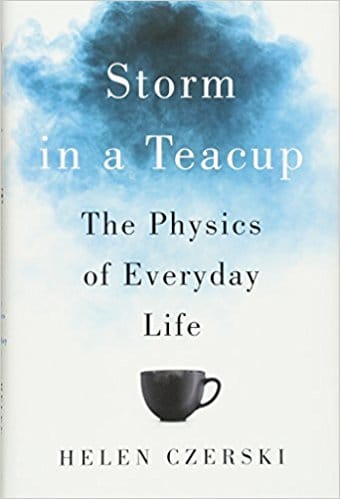Editor’s Note: This post is the first in a three-part book club discussion of Helen Czerski’s Storm in a Teacup: The Physics of Everyday Life.
No matter the time of day, it may seem too early to talk about inverse proportions.
Yet, here we are, on a poetry site, about to embark on a meander through the Ideal Gas Law. Scientific laws, it turns out, are my favorite sort of laws. They simply wish to express a thing that already is, to codify the way in which things do, in fact, behave, rather than to tell a person how they ought to behave, and the penalties to be imposed when they opt not to.
So, the Ideal Gas Law. It’s hardly out there bossing gas molecules around. It merely tells us how these organized gangs of atoms already mean to conduct themselves when we turn up the heat or apply a little more pressure. It’s that law that explains how, when kernels heat up in a skillet of oil, gas molecules knock around inside the shell until the “moment of catastrophe” when the shell, originally intended to “withstand assault from the outside, but now it had to contain an internal rebellion,” blows apart into an explosion of fluffy, delicious popcorn. What’s going on, Helen Czerski and the Ideal Gas Law will tell us, is that “for a fixed mass of gas the pressure is inversely proportional to volume (if you double the pressure, you halve the volume), the temperature is proportional to the pressure (if you double the temperature, you double the pressure), and that the volume is proportional to the temperature, at fixed pressure.”
What.
If I’ve got it right (admittedly, there’s no particular reason to believe it so), to be inversely proportional the measurements we’re tracking move away from each other at equal intervals. Thus, like Czerski’s example of “double the pressure, halve the volume,” a person could say the more of one thing, the less of the other. To be proportional, or directly proportional, on the other hand, is to move in the same direction. Or, the more of one thing, the more of the other.
From air pockets that grow in the kneading and rising of dough for focaccia bread to the katabatic winds of Antarctica to the way an elephant draws water up into its trunk to empty out into its mouth, Czerski delights in tales of the working out of the Ideal Gas Law in ways both exotic and ordinary, right up until she reaches Gerhard Zucker’s ill-fated rocket post.
She tells the story of a German inventor in the 1930s, a time when technology was at the point where “you could launch a rocket that would probably go in the right direction and probably wouldn’t kill anyone. Most of the time.” Zucker made his way to the UK and befriended a handful of folks in the world of stamp collecting who provided him with the mail in need of delivery. He built a rocket, made with a three-foot long metal cylinder, asbestos packing to protect the letters, and an explosive that would burn and produce the hot, high pressure gas needed to set the molecules into a frenzy in the front end and then got a little help from his philatelist friends. Czerski tells the story of the launch, which intended to go from one island, Scarp, to another, Harris, in Scotland:
Zucker collected 1,200 letters to send as part of the trial, each adorned with a special stamp that said “Western Isles Rocket Post.” He packed as many as would fit inside his rocket and set up the trestle, watched by a bemused crowd of locals and an early BBC-TV camera. The moment had come.
When the launch button was pressed, the battery ignited the explosive. The rapid burning generated the expected mixture of hot gases inside the copper tube, and the energetic molecules hammered on the front of the rocket, shoving it up the trestle at high speed. But after only a a couple of seconds, there was a loud, dull thud and the rocket disappeared behind a plume of smoke. As the smoke cleared, hundreds of letters could be seen fluttering to the ground. The asbestos had done its job, but the rocket had not. Hot, high-pressure gas is hard to control, and energetic molecules had broken the casing.
A few days later, 793 surviving letters from the first rocket and 142 new ones were packed into a second rocket. This one was launched from the other island, Harris, back toward Scarp. But Zucker was out of luck. The second rocket also exploded on the launch pad, this time with an even louder bang. The surviving letters were collected up again and sent to their recipients by the conventional mail system, with singed edges as souvenirs.
It’s true that rocket post may not be the most effective means of delivery. I imagine a fine Scottish woman looking up from bread baking some morning to see a rocket full of other people’s letters burning up in her front yard. Even so, the idea of rocket-borne letters seems awfully sweet, especially with the keepsake singed edges.
Rocket post didn’t work out. But gas molecules continue to bang around the world over, whenever temperature and pressure give them the chance. If nothing else, rocket science has given us squirty whipped cream in a can.
Rocket Post Writing Prompt
Sometimes we play with the Animate writing prompt, encouraging you to write from the perspective of a particular object. For today’s prompt, we invite you to write a letter, from a letter. Imagine what one of the letters that set out to launch from Scarp to Harris would say. Write your poem or vignette in first person and be specific, using nouns instead of adjectives. Consider where the letter thought it was going, who it hoped to be read by, its particular wishes and fears for its fiery journey.
As an alternate prompt, create a Poem Stack by mining the reading for words you love and then “stack” them into a poem:
Katabatic
winds
wild
fire
dragon
storm
Share your Rocket Post or Poem Stack with us in the comments.
Join us as we read Storm in a Teacup together on the following schedule:
October 18: Announcement Post
November 1: Ch. 1-3: Popcorn and Rockets, What Goes Up Must Come Down, and Small Is Beautiful
November 8: Ch. 4-6: A Moment in Time, Making Waves, and Why Don’t Ducks Get Cold Feet?
November 15: Ch. 7-9: Spoons Spirals and Sputnik, When Opposites Attract, and A Sense of Perspective
Photo by Sean McMenemy, Creative Commons license via Flickr. Post by LW Lindquist.
- Earth Song Poem Featured on The Slowdown!—Birds in Home Depot - February 7, 2023
- The Rapping in the Attic—Happy Holidays Fun Video! - December 21, 2022
- Video: Earth Song: A Nature Poems Experience—Enchanting! - December 6, 2022


Katie says
Codify:
atoms
energetic molecules
pressure
temperature
volume
scientific laws
measurements
equal intervals
inverse proportions
Katie says
Or should each word be on a single line?
Will Willingham says
Either way works. The main idea is to mine for words and play with them. 🙂
I do like the idea of energetic molecules. 😉
Katie says
Thank you, LW:)
Really looking forward to the book club! My copy came yesterday and it is fascinating.
Katie says
EARLY “AIR MAIL”
It was heart-stopping,
We were going island hopping.
Not by boat or by ship,
We were to soar through the air.
Zucker loaded us into his rocket;
‘twas a nifty little pocket.
Then he lit the fuse
And stepped back.
We flew over the channel,
Looked down and saw flannel.
Shirts flapping in the breeze,
Only to hear “Splash!”
Now, wait just a minute,
A fix and we were in it!
How then to keep the thing up
Without it getting wet or burnt?
Hey, watch the wise-cracks
We’ll soon get back on track.
Why, only just today
We’ve already found one way air mail cannot be done!
Will Willingham says
Love the optimism of your letters. 🙂
Katie says
Thanks:)
L.L. Barkat says
I thought the party trick with the raisins was pretty fun. I laughed out loud at the final result, though ;-).
Also, I wish I’d known about the egg in a bottle trick when I was teaching my kids about science. Heck, I might still do that one afternoon, just because, you know, we are *lifelong learners* here. 🙂
Though I’m not sure how any of this is going to be useful to me, I feel like I’ll use it someway somehow sometime. Like, if I ever need to wow an empire with a halved sphere and some horses who can’t pull apart what seems like a child could do it.